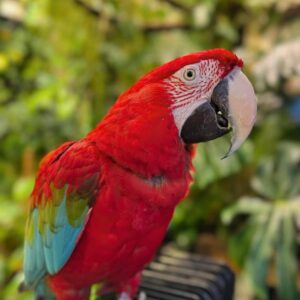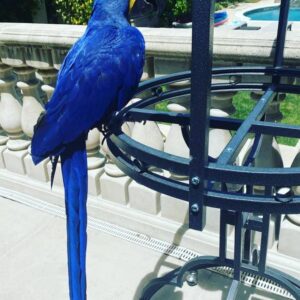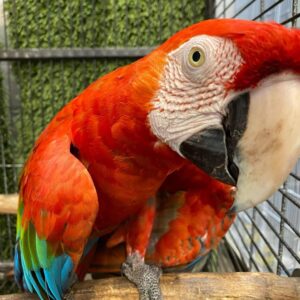Macaw Parrots
Macaw Parrots
Macaws are large, colorful parrots native to Central and South America, and the Caribbean. They are among the most iconic and recognizable parrot species, known for their vibrant plumage, powerful beaks, and impressive size. They are popular as companion animals, but their size, intelligence, and long lifespan make them a significant commitment.
Physical Characteristics:
- Size: Macaws are large parrots, ranging in size from about 2.5 to 5 feet (0.75 to 1.5 meters) from beak to tail tip, depending on the species. This includes their very long tails.
- Color: Macaws are renowned for their vibrant and diverse plumage. Common colors include blue, yellow, red, green, and various combinations thereof. Some species have bare facial patches.
- Beak: They possess large, powerful, curved beaks designed for cracking nuts, seeds, and manipulating objects. Their beaks are incredibly strong
- Lifespan: Macaws have a long lifespan, often living for 40-80 years in captivity, and some individuals have been known to live even longer with exceptional care.
Personality and Intelligence:
Macaws are intelligent, social, and playful birds with distinct personalities that vary somewhat by species but share some common traits:
- Intelligent and Vocal: Macaws are highly intelligent and possess excellent vocal abilities. Many species are known for their ability to mimic human speech and other sounds, although their talking ability can vary individually. They can be quite loud.
- Social and Affectionate: They are generally social and enjoy interacting with their owners. They can be affectionate and form strong bonds, often preferring one person in the household. They require a lot of social interaction.
- Playful and Energetic: Macaws are playful and energetic birds that need plenty of exercise and mental stimulation. They enjoy playing with toys, exploring their surroundings, and interacting with their owners. They need a large space to fly and play.
- Independent and Strong-Willed: They can be independent and strong-willed, requiring consistent training and socialization to prevent behavioral problems. Early and consistent training is key.
- Can be Noisy: Macaws are known for their loud vocalizations, which can be a major consideration for potential owners, especially those living in apartments or close proximity to neighbors. Their calls can be heard for long distances.
- Destructive Chewing: They have a strong need to chew and can be destructive if not provided with appropriate outlets for this behavior. They need a constant supply of chew toys and may even need their environment modified to protect furniture and belongings.
- Prone to Behavioral Problems: Due to their strong bonds and need for attention, they are prone to behavioral problems such as feather plucking, screaming, and aggression if they are neglected or mistreated.
Important Considerations for Ownership:
- Commitment: Owning a macaw is a significant long-term commitment due to their long lifespan. This is a multi-decade commitment.
- Space: Macaws require a large amount of space. They need a large cage or aviary and room to fly and exercise.
- Attention: They require a lot of attention and interaction. They need several hours of interaction with their owners each day.
- Training: Consistent training is essential to manage their behavior and prevent unwanted habits. Positive reinforcement methods are most effective.
- Enrichment: They need a stimulating environment with plenty of toys, puzzles, and opportunities for foraging and exploration.
- Socialization: Early and consistent socialization is crucial to help them develop into well-adjusted companions.
- Diet: A proper diet consisting of high-quality pellets, fresh fruits, vegetables, and occasional nuts and seeds is essential for their health.
- Veterinary Care:
They require specialized avian veterinary care. Finding a vet experienced with macaws is important.
- Financial Commitment: Macaws are expensive to purchase and maintain. Their food, toys, veterinary care, and housing can be costly.
Macaws can be wonderful companions for the right person, but their unique needs and potential for behavioral problems make them a challenging pet for some. Potential owners should thoroughly research their requirements and be prepared to make a significant commitment of time, money, and patience before bringing one home. They are not a pet for everyone.
Showing all 7 results







